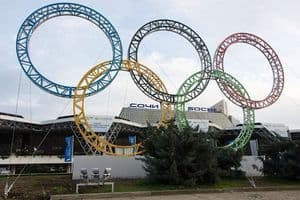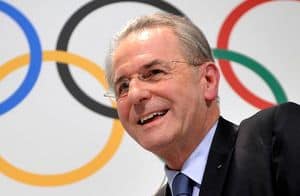
As the countdown continues to the 2014 Winter Olympic Games in Sochi, controversy over Russia's anti-gay laws continues to cast its shadow, and plague both the governing bodies of the Olympics as well as many of its major sponsors. Worse yet, both sides have seemed to dig their heels in. Athletes such as Johnny Weir and Blake Skjellerup have already made it clear that they plan on conducting small gestures of protest at the games, regardless of the consequences. Meanwhile, both the Russian government and the International Olympic Committee have made it clear that no protest or public demonstration for LGBT equality will be tolerated. Worse yet, the U.S. Olympic Committee has urged all of its LGBT athletes to comply with Russia's anti-gay "propaganda" law.
Both sides of this debate have made their stances clear, and as the clock continues to steadily bring us toward February, neither side has shown sides of backing down. If this continues, the controversy is set to come to ahead during the games, a fact that was explored recently by Jim Litke in a column for the Associated Press. Litke contemplates the idea of athletes making good on their promises to demonstrate, and weighs the real-world possibilities should it actually happen:
"Does the IOC or a National Olympic Committee, for example, step in and risk the embarrassment of sending an athlete home for a political gesture? Or stand by and say nothing while the local authorities bundle him or her onto the first flight? Do major sponsors like Coca-Cola, Visa, Dow, Omega and Panasonic threaten to pull out? Does NBC report aggressively on every incident? Take the under on those bets."
 Litke does make an apt point when it mentions the fact that this issue concerns more than just the governing bodies and athletes of the Olympic games. Corporate sponsors also have a role to play in this, and have already taken a rather timid stance when asked to comment on the human rights atrocities in Russia. NBC has also faced the idea of a possible Olympic boycott, and has also been petitioned to add human rights concerns to its upcoming coverage of the games.
Litke does make an apt point when it mentions the fact that this issue concerns more than just the governing bodies and athletes of the Olympic games. Corporate sponsors also have a role to play in this, and have already taken a rather timid stance when asked to comment on the human rights atrocities in Russia. NBC has also faced the idea of a possible Olympic boycott, and has also been petitioned to add human rights concerns to its upcoming coverage of the games.
He uses an example lifted from last year's Olympics in London to illustrate the IOC's resoonse to a previous issue of human rights:
"When a few Muslim countries threatened to maintain the status quo back home and send teams without women to the 2012 London Olympics, the IOC bent over backwards to change the old order. It played fast and loose with its own rules so some of those athletes could compete.
"Granted, from a competitive standpoint, most of the events they took part in were a farce. So, in hindsight, was the line in IOC president Jacques Rogge's speech at the opening ceremony:
"'For the first time in Olympic history all the participating teams will have female athletes. This is a major boost for gender equality.'"
Unfortunately, Litke isn't confident that the IOC will act similarly to aid its LGBT athletes, since the threat of boycotts by LGBT rights advocates hasn't proved threatening enough to prompt any action. He cites that as the primary reason why the IOC and its sponsors have responded the way that they have. "They repeated the old saw about the Olympics being above politics, then grabbed the cash with one hand and issued a statement with the other," he argues, before adding, "everybody else involved has decided for now that the best strategy is to ride out the storm, at least until all the checks have cleared."



